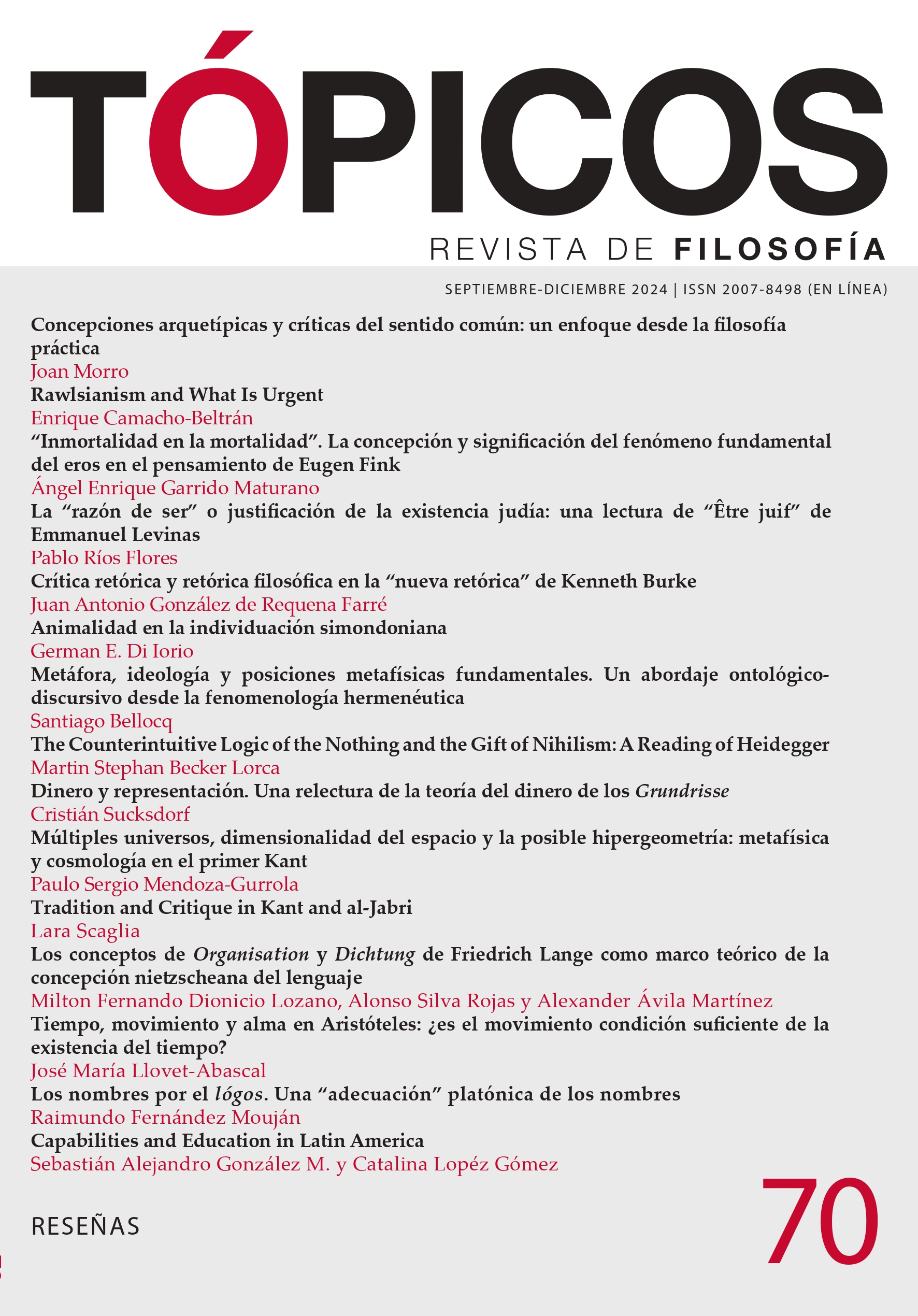Tiempo, movimiento y alma en Aristóteles: ¿es el movimiento condición suficiente de la existencia del tiempo?
Pubblicato 2024-08-15
Parole chiave
Come citare
Copyright (c) 2024 Tópicos, Revista de Filosofía

Questo lavoro è fornito con la licenza Creative Commons Attribuzione - Non commerciale - Non opere derivate 4.0 Internazionale.
Downloads
Altmetrics
Citas
Abstract
En este artículo discuto las condiciones de posibilidad de la existencia del tiempo tal como lo entiende Aristóteles en Física IV, 10-14. Con este propósito, presento tres experimentos mentales que ayudan a esclarecer la naturaleza del tiempo. De acuerdo con mi lectura, el movimiento no es condición suficiente de la existencia del tiempo, pero sí lo es, en cambio, que el movimiento pueda ser medido —aunque no lo sea efectivamente—. Hay tiempo cuando un movimiento cualquiera puede ser puesto en una relación de proporción con algún otro movimiento.
Riferimenti bibliografici
- Aoiz, J. (2007). Tiempo y alma en Aristóteles. Equinoccio.
- Aristóteles. (1936). Physics: A Revised Text with Introduction and Commentary. W. D. Ross (trans.). Oxford University Press.
- Aristóteles. (1982). Tratados de lógica (Órganon). I. Categorías. Tópicos. Sobre las refutaciones sofísticas. M. Candel Sanmartín (trad.). Gredos.
- Aristóteles. (1987). Acerca de la memoria y de la reminiscencia. En Acerca de la generación y la corrupción. Tratados breves de historia natural. (pp. 233-255). E. La Croce y E. Bernabé (trads.). Gredos.
- Aristóteles. (2009). Acerca del alma. De Anima. M. D. Boeri (trad.). Colihue.
- Boudreault, P.-L. (2020). Aristotle’s Account of Time: A Moderate Realism. [Tesis doctoral, Universidad de Ontario Occidental]. Electronic Thesis and Dissertation Repository. URL: https://ir.lib.uwo.ca/etd/7514.
- Bowin, J. (2009). Aristotle on the Order and Direction of Time. Apeiron, 42(1), 33-62.
- Bowin, J. (2018). Aristotle on the Perception and Cognition of Time. En J. Sisko (ed.), Philosophy of Mind in Antiquity. The History of the Philosophy of Mind: Volume 1. (pp. 175-193). Routledge.
- Buridán, J. (2016). Questiones super octo libros Physicorum Aristotelis (secundum ultimam lecturam). Libri III-IV. M. Streijger y P. J. J. M. Bakker (eds.). Brill.
- Cleary, J. J. (1995). Aristotle and Mathematics: Aporetic Method in Cosmology and Metaphysics. Brill.
- Coope, U. (2001). Why Does Aristotle Say That There Is No Time Without Change? Proceedings of the Aristotelian Society, 101(1), 359-367.
- Coope, U. (2006). Time for Aristotle: Physics IV. 10-14. Oxford University Press.
- Harry, C. C. (2015). Chronos in Aristotle’s Physics: On the Nature of Time. Springer.
- Inwood, B. (1991). Aristotle on the Reality of Time. En L. Judson (ed.), Aristotle’s Physics: A Collection of Essays. (pp. 151-179). Oxford University Press.
- Lederman, H. (2014). Ho pote on estí and Coupled Entities: A Form of Explanation in Aristotle’s Natural Philosophy. En B. Inwood (ed.), Oxford Studies in Ancient Philosophy. Volume 46. (pp. 109-164). Oxford University Press.
- Ornelas, J., Cíntora, A. y Hernández, P. (2018). Trabajando en el laboratorio de la mente: naturaleza y alcance de los experimentos mentales. Universidad de San Luis Potosí.
- Rashed, M. (2020). Chapitre V: Les Petites Catégories. En R. Chiaradonna y M. Rashed (eds.), Boéthos de Sidon – Exégète d’Aristote et philosophe. (pp. 213-254). DOI: https://doi.org/10.1515/9783110699845-007.
- Roark, T. (2011). Aristotle on Time: A Study of the Physics. Cambridge University Press.
- Ross H. E., Lock, G. y Schönbeck, G. L. J. (2012). Aristotle (c. 384-322 BC) and Size-distance Invariance. Proceedings of Fechner Day, 28, 119-124.
- Sentesy, M. (2018). The Now and the Relation between Motion and Time in Aristotle: A Systematic Reconstruction. Apeiron, 51(3), 279–323. DOI: https://doi.org/10.1515/apeiron-2017-0043.
- Simesen, M. (2017). Conceptos y fundamentos para una crítica del “tiempo vulgar” en Heidegger. Tópicos (México), 52, 277-318. DOI: https://doi.org/10.21555/top.v0i52.787.
- Simplicio. (2014). On Aristotle Physics 4.1-5 and 10-14. J. O. Urmson (trad.). Bloomsbury.
- Stein, N. (2016). Aristotle on Parts of Time and Being in Time. The Review of Metaphyics, 69(3), 495-518.
- Vigo, A. G. (2006a). Aristóteles y la infinitud extensiva del tiempo (Fís. IV 13, 222a28-b7). Tópicos (México), 30 bis, 171-205. DOI: https://doi.org/10.21555/top.v0i0.208.
- Vigo, A. G. (2006b). Indiferentismo ontológico y fenomenología en la Física de Aristóteles. En A. Vigo (ed.), Estudios aristotélicos. (pp. 237-276). EUNSA.
- Vigo, A. G. (2006c). Orden espacial y orden temporal según Aristóteles (Fís. IV 11, 219a10-21). En A. Vigo (ed.), Estudios aristotélicos. (pp. 87-106). EUNSA.
- Vigo, A. G. (2012). Comentario. En Aristóteles, Física. Libros III & IV. (pp. 103-285). Biblos.
- Volpi, F. (1988). Chronos und Psyche. Die aristotelische Aporie von Physik IV 14, 223a16-29. En E. Rudolph (ed.), Zeit, Bewegung, Handlung. Studien zur Zeitabhandlung des Aristoteles. (pp. 26-62). Klett-Cotta.
- Wieland, W. (1992). Die aristotelische Pyhsik. Vandenhoeck & Ruprecht.
- Zachhuber, J. (2022). Time and Soul: from Aristotle to St. Augustine, (Band 6 der Reihe Chronoi), de Gruyter. https://doi.org/10.1515/9783110692754
- Zagal, H. (2019). La música en Aristóteles. Open Insight, 10(19), 149-163. DOI: https://doi.org/10.23924/oi.v10n19a2019.pp%25p.358.





